The Right to Protest is Not Limitless
Legal guidelines for protestors.
Slate’s Dahlia Lithwick addresses directly something I’ve been getting at obliquely for a quite some time: the intersection between the sacrosanct rights of free speech and assembly with the rights of others.
For starters, the First Amendment is perfectly clear that you have a right to speak freely, and to “peaceably assemble.” But those rights are hardly absolute, and courts have long allowed for neutral “time, place, and manner” regulations, which means that the government can generally prohibit you from, say, sleeping in public spaces, or blocking public sidewalks, or lighting massive fires, even if you are doing so as an exercise of your right to speak and protest.
[…]
So the best way to have your message heard is to understand that merely feeling really strongly about something is not the sole test of your First Amendment protections. AsWendy Kaminer puts it in the Atlantic, describing protesters who feel their First Amendment right to protest has no boundaries: “Occupy Wall Streeters rightfully incensed by a regulatory regime that creates and protects gross economic inequality should be among the first to recognize this fundamental principle—that everyone is equal under law.”
[…]
The real problem lately is how to tell whether the regulations being used to shut down protest are bogus attempts to use neutral-sounding rules to suppress speech. One of the questions raised by last week’s threat to evacuate the hundreds of people at Zuccotti Park was whether they were creating dangerous and unsanitary conditions by failing to dispose of garbage properly. But as a group of attorneys from the National Lawyers Guild argued in a letter responding to this claim, what appeared to be a neutral rule was merely a pretext for breaking up the protest: “Under the guise of cleaning the Park you are threatening fundamental constitutional rights,” they wrote. “There is no basis in the law for your request for police intervention, nor have you cited any.” One of the sticky wickets for Mayor Michael Bloomberg is that even neutral-sounding reasons to break up a protest can start to sound pretextual.
Probably the most thorough exploration of the free-speech issues surrounding protest and Occupy Wall Street was offered last week by Christopher Dunn, the associate legal director of the New York Civil Liberties Union. It’s worth reading all the way to the bottom as he works through the questions of whether the park is public or private and whether sleeping as part of a protest is a protected activity. Dunn points out that, among other things, the protest at Zuccotti Park is complicated by the fact that the park is privately owned by Brookfield Office Properties, a private commercial real-estate company that was given the right to build a supersize building north of the park in exchange for creating a privately owned public space. (Here’s Matthew Yglesias on why that’s never a great idea as a policy matter.)
[…]
The case law on sleeping and protesting is both fascinating and hilarious. The most important case Dunn identifies is Clark v. Community for Creative Non-Violence, a 1984 decision from the Supreme Court about advocates for the homeless who were protesting (and sleeping outdoors) in Lafayette Park, across from the White House, and on the National Mall. The issue for the court was whether denying permits to sleep overnight as part of the protest violated the First Amendment. The court said it was OK to prohibit sleeping. At the same time, it conceded that “overnight sleeping in connection with the demonstration is expressive conduct protected to some extent by the First Amendment.” It then got itself out of this legal and logical dead end by finding that the rule barring overnight protests was constitutional because it “narrowly focuses on the Government’s substantial interest in maintaining the parks in the heart of our Capital in an attractive and intact condition, readily available to the millions of people who wish to see and enjoy them by their presence.”
[…]
If you want to get arrested, it’s very easy to get arrested in America. But if you want to exercise your right to speak and assemble effectively, it’s easy to do that as well. This hardly means there won’t be confrontations, arrests, and mass evacuations in the coming days and weeks, and that courts will not be called on to balance the rights of protesters against the cities’ various rules. One of the great truths the OWS movement has revealed, and one that’s worth keeping in mind as the protests spread, is that in general, the police are not working against you. So long as you are smart, civil, and aware of the local rules and concerns, you can live to protest another day.
Of course, for some protest movements–typically smaller ones than Occupy Wall Street–getting arrested is the only way to draw attention to one’s protest. Otherwise, following the rules*, respecting public spaces, and otherwise coming across as decent people with legitimate grievances is the way to go to both stay out of jail and gain public sympathy.
__________
*This doesn’t work if it’s the rules themselves that you’re protesting. Obviously, the Civil Rights movement was breaking the law in going into segregated restaurants and buses to claim their seats. That’s an act of civil disobedience and getting arrested to shine a light on the shamefulness of the rules is really the whole point. But Occupy Wall Street isn’t about the right to pitch tents in public parks.

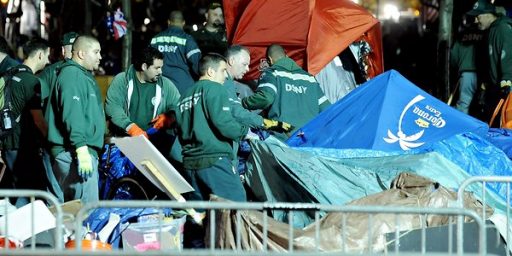
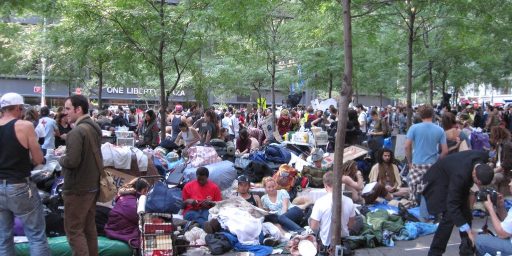
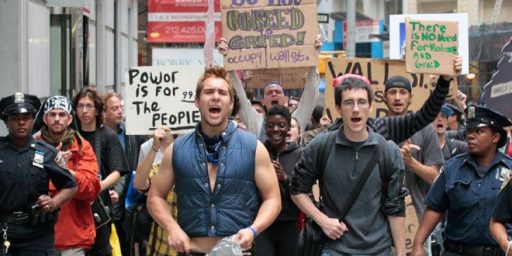
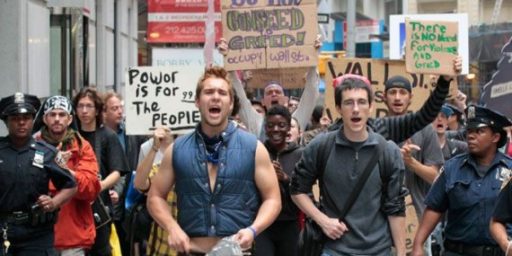
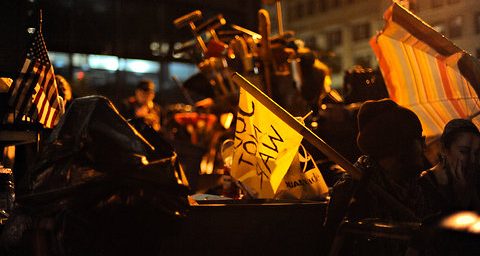
Like I’ve said before, hanging out in a park for three weeks — which most people cannot afford to do even if they are unemployed — and participating in the nightly drum circle is hardly a serious manner in which to address an issue.
It’s all small beer compared to …
@john personna:
Yes, the Bonus Army may be the only thing comparable to this, but that didn’t exactly get their demands yet.
And considering that those men had been screwed over after fighting in a completely pointless war, one can at least sympathize with their plight.
@Doug Mataconis:
Are you sure there weren’t other tiny encampments forgotten along the way? Googling I see Vietnam era “piece camps” etc.
This park thing is small enough that, even if Occupy is successful, it won’t be the camping that’s remembered.
If all they do is camp, they’ll be remembered much as the hippies are. Amusing, but ultimately ineffective
@Doug Mataconis:
You’ve really got to stop these self-conflicting posts and comments. If OWS were to be ineffective, you should have had to the confidence to say that once, and only once. You wouldn’t need to think about them again. Ever.
But if you keep commenting and posting on them, then you’ve kind of got to give up on the “ineffective” bit. Heck, you yourself have been changed by them.
They have captured your energy.
There is a major flaw in arguments such as “free speech is limited to peaceful assembly”. (Let alone the snarky remark that only unserious people can afford to spend three weeks in a park protesting).
The same arguments were used against the women’s right to vote movement, the civil rights movement (remember those kids spending weeks in a bus tour?), the anti Vietnam war protests etc.
The OWS movement doesn’t (yet?) have the clear objective and leadership the aforementioned ones had, but dismissing a movement simply because they don’t follow your rulebook is very “inside the beltway” thinking.
@john personna: Nicely written john, and irrefutable.
@Murray:
First of all, as James points out, you need to read the First Amendment, which makes reference to the right of the people to “peaceably assemble.” It doesn’t say “assemble wherever they want, whenever they want, and leave whenever they feel like it.” The OWS people have a right to protest, but do they have the right to prevent people from the use and enjoyment of public spaces for weeks on end? Numerous Supreme Court cases would say no and, though I consider myself a First Amendment zealot, I cannot say those cases were decided incorrectly.
Second, and as James also pointed out, previous protest movements accepted the fact that they would engage in activities that would lead to arrest. That was often their point. Just ask Dr. King. Or the Suffragettes.
The question here isn’t what these people believe, but whether they have the right to disrupt the life of a community for extended periods of time to communicate those beliefs.
@john personna:
Whether they are “effective” in the long term remains to be seen. They can’t even seem to agree what they’re protesting about or what they want. Given that, it’s darn near impossible for them to achieve anything.
@Doug Mataconis:
The lady doth protest too much, methinks. (Hamlet, the Prince of Denmark, Act Three, Scene Two, line 228)
Can we look forward to more blase dismissals to the protesters in the future? Because as john personna pointed out, you seem very concerned about being very unconcerned about them. In fact, that seems to be all you want to say about the protesters, 4 weeks into the protest. At least James is making an effort to understand them on their terms. You won’t even put forth that minimal effort. So much for the virtue of hard work.
And now I leave you with a (edited) song from Babes in Arms, with Doug Mataconis as the star!
“Poor Dougy one-note
sang out with “gusto”
And just overlorded the place
Poor Dougy one-note
yelled willy nilly
Until he was blue in the face
For holding one note was his ace
Couldn’t hear the brass
Couldn’t hear the drum
He was in a class
By himself, by gum!
Poor Dougy one-note
Got in OTB
Indeed a great chance to be brave
He took his one note
Howled like the North Wind
Brought forth wind that made right-wingers rave,
While Rand turned round in her grave!
Couldn’t hear the flute
Or the big trombone
Ev’ry one was mute
Dougy stood alone.”
@Lit3Bolt:
Perhaps in your next comment, you’ll address the legal issues that this post raises rather than writing bad poetry
First, I was just there. The park is spotless. The people are very well-behaved. The mood is pleasant. The population includes some hippies, but is not limited to them by any stretch. There were quite a number of middle-aged, middle-class folks there.
The drumming is undoubtedly annoying. I’m not a big fan of untalented people drumming, myself. But it’s at one end of the park and they are apparently observing quiet time at 10 PM. Given the ambient noise in Manhattan — jackhammers, trucks, horns — it’s not particularly bothersome.
I don’t think they have a right to camp there. I think they are practicing civil disobedience. But it is civil.
So the question is whether the authorities in their wisdom believe it is a better or worse to force them out. So far the decision seems to be to leave them be.
Doug was a big believer in the weather solving the problem. But OWS seems to have a quarter million dollars (including a hundy from yours truly) and an awful lot of donated supplies. So I’m not so sure bad weather will solve the matter.
As I explained to my very passionate 14 year-old son, everyone so far is playing their assigned roles. If the protesters are arrested and taken off to jail they will make bail and probably go straight back. That’s almost a necessary part of the forging of any protest movement. It wouldn’t be a protest without some passive resistance and some weary cops carrying people to paddy wagons.
And of course, with any protest movement there are the old cranks huffing and puffing and denouncing from the comfort of their homes and offices.
if the government has ultimate say on when and where and how you can assemble then there simply is no right to assemble. It is one thing to say there must be limitations for safety, just as speech can be curbed when it presents a direct threat of harm. But saying the government can tell you you can’t assemble here, now, even when doing so poses no risk to others, is akin to saying you only are allowed free speech in special zones…
…oh. yeah.
Short version- the courts were wrong. Unambiguously.
Doug Mataconis: The right to protest is not limitless. If these
animalspeople want to do it right they’ll raise several hundred million dollars, hire ex-politicians to lobby their old colleagues, offer lucrative jobs to government officials in exchange for their votes and use their newfound power to distort the political process. Don’t any of you understand how liberty works?!@Doug Mataconis:
I’m sure a bar can always been set that they will not meet, just as many can be set that they’ve already passed.
“Congress shall make no law respecting an establishment of religion, or prohibiting the free exercise thereof; or abridging the freedom of speech, or of the press; or the right of the people peaceably to assemble, and to petition the Government for a redress of grievances.” The use of semicolons instead of a comma indicates separation of ideas expressed. Therefore peaceable assemblage and redress of grievances were considered linked.
sO APPARENTLY until THE gOVERNMENT ADDRESSES THE GRIEVANCES, IT IS ALL GOOD………… And no surprise as to the bleatings of DM…he is a weak attempt at undercover undermining…
@CONCRETEBLUE: Doug is one of those “liberty for me but not for thee” libertarians.
I think ultimately there has to be rights of assembly, if only for practical reasons. For instance, suppose me and my friends decide to assemble on your front lawn for whatever political reason we might dream up (dislike of the colour of your house, or the type of car you drive) – put up tents etc. I suspect eventually most folks would say we should be moved off. Same thing if a group of a hundred camp out on your local elementary school playgrounds to protest some educational policy – even if they weren’t a danger to the children, I suspect most (at least if it were there kids in the school) would argue that crossed a line.
The line for me would be either that the protest is silly (ie the colour of your house), or that its disrupting a necessary function of society (educating children). And of course safety is always an issue – blocking emergency vehicles is a no-go.
However, I don’t see the OWS hitting any of those points yet. They seem to be willing to allow emergency vehicles through, no one doubts the cause is serious (the doubts are on whether the protest is effective), and they don’t seem to be blocking a vital function of society … they’re creating an inconvenience for some, nothing more.
But actually society is usually fairly quick to limit protests, both left wing (such as the anti-war protests were or this OWS), or right wing like blockading abortion clinics. I think most people can come up with things they feel shouldn’t be allowed to be disrupted by protests, the argument is generally just on what.
@Ben Wolf:
No, Ben, you’re just one of those people who skips over words in the First Amendment
@Doug Mataconis: It doesn’t say “assemble wherever they want, whenever they want, and leave whenever they feel like it.”
Yes it does; what do you think “shall not be infringed” means?
In Doug world, of course, the phrase means “provided that Doug approves,” but we’re not living in Doug world, yet.
@voice: Thank you, Jesus!
@A voice from another precinct: @concreteblue: Actually, “infringed” is and always has been a legal term of art. It does not mean what you seem to think it does.
Additionally, “shall not be infringed” is in the 2nd Amendment, not the 1st. The 1st is actually much stronger: “Congress shall make no law respecting an establishment of religion, or prohibiting the free exercise thereof; or abridging the freedom of speech, or of the press; or the right of the people peaceably to assemble, and to petition the Government for a redress of grievances.” But even that seemingly unambiguous language has never been applied literally. The guys who wrote this passed the Alien and Sedition Acts, for example.
@James Joyner: I’m not quite as witless as you might like to think (although it is sometimes fun to pretend that I am–as in my last post for example). I have known for many years that in politics and the law words mean, as they do in the Queen of Hearts, Wonderland realm, exactly and only what the people who are in power intend to allow them to mean. It is the factor permits the same men to declare that “all men are created equal…” and subsequently commit to a constitution that allows that men who own property are more equal than men who don’t and that other men only constitute 3/5th of a citizen. (And just so you’ll know, I DO understand the nature of compromise–and have also read where Locke observed that laws need not be either moral or good, only agreed upon,)
Most of the time, my comments on Doug’s posts are prompted by my deep and abiding belief that people who lead with their chins deserve to have those chins hit. I really gave up believing that Doug had any credibility at all on many matters some time ago, but I do like pigmy baiting and Doug is the chief pigmy at OTB.
@A voice from another precinct:
If that’s what it means then, please, explain to me why the founders bothered putting the word “peaceably” before “assemble”
Additionally, “shall not be infringed” is in the 2nd Amendment, not the 1st.
Indeed. The word people don’t seem to understand is “abridge.”
Is that really the precedent you want to invoke? The ASA was a horribly unconstitutional law that led the federalists to be roundly kicked out of office. It’s like saying “of course you don’t have the right to live where you like because afterall we rounded up the japanese during WW2.” Yeah but that was unbelievably illegal to do…
To make it still possible to outlaw riots.
@Tlaloc: My point on Alien and Sedition is that, rather clearly, the Federalists, including key framer John Adams, thought it was with Congress’ power to limit speech on grounds of harmfulness.
And, sadly, Koramatsu held that internment met strict scrutiny.
And that interpretation has always been extremely controversial, was arguably repudiated by the electorate of 1800, and thus i think makes a very bad precedent upon which to base modern interpretations.